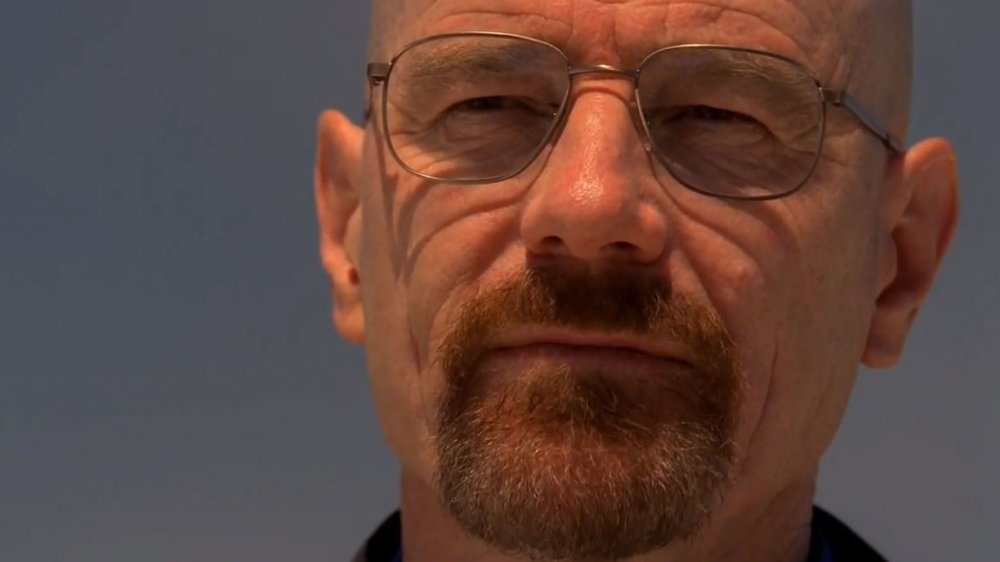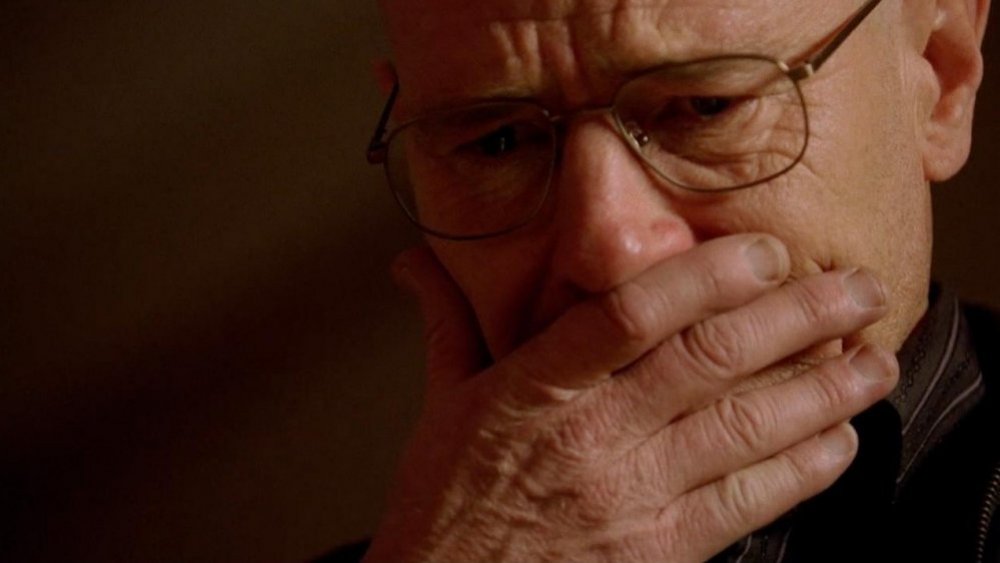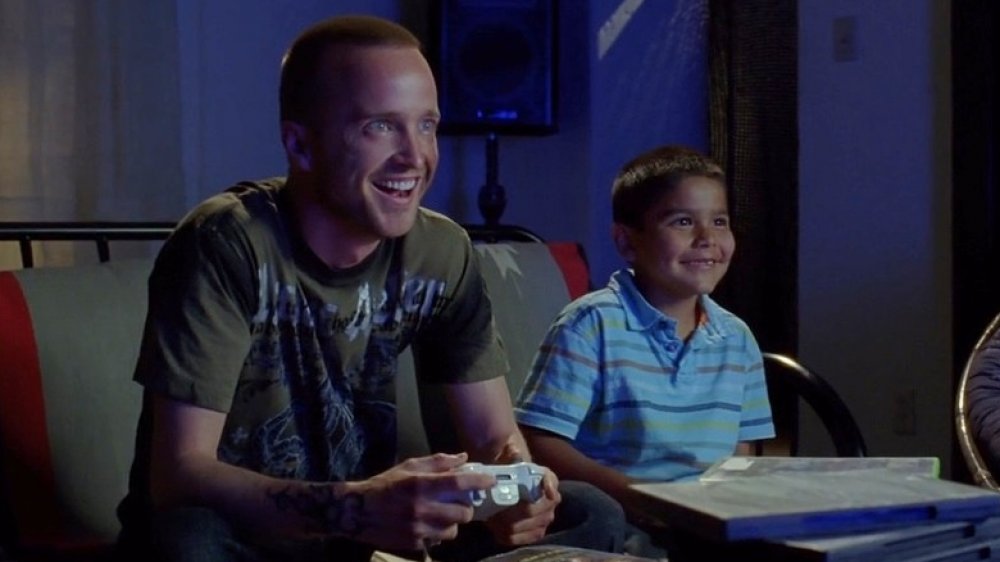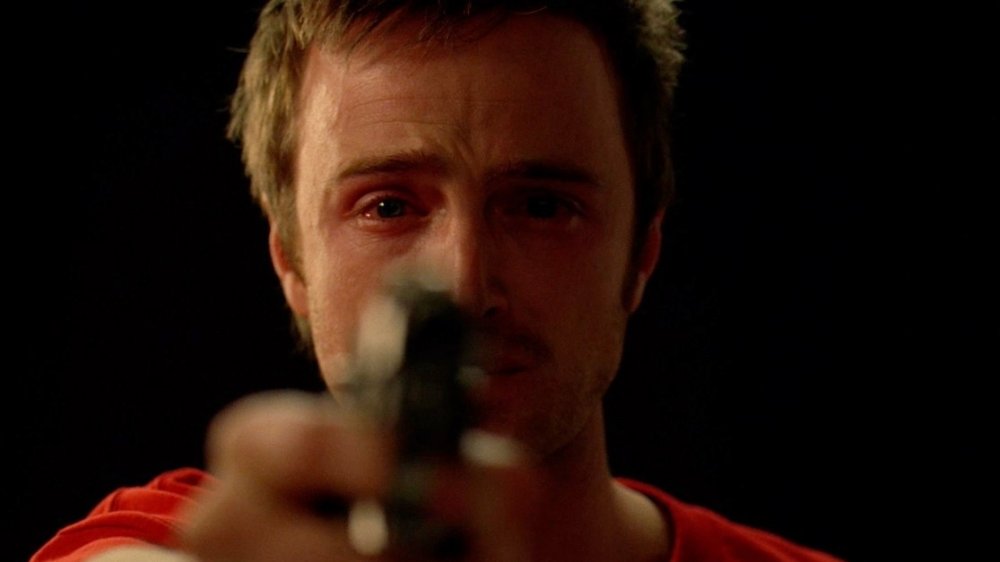This Was The Worst Thing Walter White Did On Breaking Bad
It's a testament to the greatness of AMC's Breaking Bad that, seven years after it aired its final episode, it's still being discussed as if it concluded yesterday. Rarely has every element of a series been so notable and special. There's no aspect of the show that didn't draw heaps of well-deserved praise, from its beautiful cinematography to its astonishingly strong writing and direction to the efforts of every member of its stellar cast. It's as close to a perfect drama series as has ever aired on television — and yet, all of its remarkable achievements in storytelling still tend to be overshadowed by the one towering performance at its center, one which no less an authority than the great Sir Anthony Hopkins called the finest piece of acting he had ever seen.
We speak, of course, of Bryan Cranston's lead performance as the man known to his family as Walter, to his high school chemistry students as Mr. White, and to the dregs of the Albuquerque criminal underground as Heisenberg. Never before or since has a series given us a clear protagonist to root for, only to twist that same character into the undisputed villain by its end — a transition that perhaps only Cranston, whose genial, fatherly manner belies a dark streak a mile wide, could have pulled off so effectively. That this transition happened so gradually, often by the smallest of degrees, speaks to the tightrope that Cranston had to walk over Breaking Bad's run — one that ensured that the audience would still find itself rooting for Walter, even as he turned corner after corner, leading him deeper into the darkness.
To list all of Walter's misdeeds, we'd probably have to write a novel. But there are a few moments that, had he made different choices, might have presented a path to some kind of redemption. Instead, they became moments that defined the man — not Walter White, but Heisenberg, one of the most terrifying and ruthless characters in all of fiction.
Walter White let Jane Margolis die
In Breaking Bad's second season, Walter's former student-turned-partner in meth Jesse Pinkman (Aaron Paul) finds himself in dire straits after being kicked out of his house by his parents. Fortunately for him, he's able to find a landlord who doesn't ask too many questions — Jane Margolis (Krysten Ritter), with whom he eventually strikes up a relationship.
This relationship would end up being the basis for one of the greatest tragedies of Jesse's life. Jane leads him down the slippery slope to heroin addiction, into which the pair find themselves sinking ever deeper despite the best efforts of Jane's father Donald (John de Lancie) and Walter — for whom the final straw comes in the season 2 episode "Phoenix," in which Jane attempts to blackmail him into ponying up a huge sum of cash owed to Jesse for their illegal activities.
On the evening before Jane is to go to rehab at her father's behest, she and Jesse shoot up one last time before going to sleep. Walter, after a chance encounter with Donald in a bar, discovers them passed out upon going to Jesse's place in an attempt to mend fences. As he tries to wake up his young partner, Jane begins to cough — and then to vomit, and then to choke. Walter's motivation for what he does next has been endlessly discussed since "Phoenix" aired — but whether it's to save Jesse from the throes of addiction, to eliminate an obstacle to their continuing enterprise, or to save his own skin, Walter does nothing. For a brief moment, the horror of what he's allowing to happen seems to register on his face... before he steels himself, and watches as Jane dies in front of him.
Walter White poisoned Brock to the same end
Jesse is, of course, racked with guilt over Jane's death — but during Breaking Bad's third season, he meets a young woman named Andrea (Emily Rios) at a Narcotics Anonymous meeting, and their relationship turns out to be a great deal healthier. One major reason for that: Andrea's six-year old son Brock (Ian Posada), to whom Jesse immediately takes a shine, and whose health scare near the end of the fourth season would turn out to be incredibly significant.
In that season's penultimate episode "End Times," Brock is rushed to the hospital with an undetermined but serious illness — one which Jesse immediately suspects Walter of orchestrating. At this time, the relationship between Walter and the pair's employer, restaurateur and drug lord Gus Fring (Giancarlo Esposito) has become strained to say the least, and while Fring spends a goodly part of the season attempting to win Jesse's loyalty, Walter has supplied Jesse with a small amount of the deadly poison ricin with which to kill Fring, should he get the chance.
After Brock falls ill and Jesse discovers that the ricin is missing, Walter is able to convince Jesse that Fring is responsible, and has been using the boy to drive a wedge between them. When it turns out that Brock isn't suffering from ricin poisoning, but has somehow ingested a toxic plant known as Lily of the Valley, Walter is fully exonerated in Jesse's eyes — but we, the audience, are shown the truth in the final shot of the final episode of the fourth season. In it, we see that there was a potted Lily of the Valley plant growing in Walter's backyard — proof that the motivations Walter had ascribed to Fring were actually his own, and that nothing, not even the health of a child, would stop him from tightening his grip on Jesse.
Walter White made Jesse commit cold-blooded murder
That grip was tight, indeed — and to illustrate just how tight, look no further than the season 3 finale of Breaking Bad, and the circumstances which put Walter and Gus at odds in the first place. Near the season's end, Jesse discovers that Gus has been using Andrea's 11-year old brother Tomas as a hitman, and when the boy was compromised, a pair of Gus' dealers killed him. Jesse, distraught, takes it upon himself to kill those dealers — but Walter arrives in the nick of time to do it himself.
Jesse goes into hiding, and Walter, unwilling to tell Gus where he is, realizes that Gus has been planning to replace him with Gale Boetticher, a skilled and mild-mannered chemist who had assisted (and befriended) Walter earlier in the season. Once Gale was comfortable with his process, Walter's time would be up — so, in order to save himself, he does the unthinkable.
Cooking up (no pun intended) a pretense to make a phone call while being held captive by Gus' men, Walter calls Jesse, gives him the location of Gale's apartment, and orders him to kill Gale — a man Jesse has never met — so that Gus would be forced to keep them both alive to cook. Gus' right-hand man, Mike Ehrmentraut (Jonathan Banks) sends a henchman to intercept, but Jesse arrives at Gale's apartment first.
With tears in his eyes, the young man contemplates the decision he has to make. He draws his gun, and — over Gale's plaintive objections — aims and fires. Sure, Gale wasn't exactly an innocent; he was a meth cook, perfectly willing to serve up poison to his community for profit. But in committing his cold-blooded murder, Jesse surrenders a piece of his soul to Walter White — a man who never knew an ideal he wouldn't abandon, or a loved one he wouldn't betray, if it suited his purposes.



